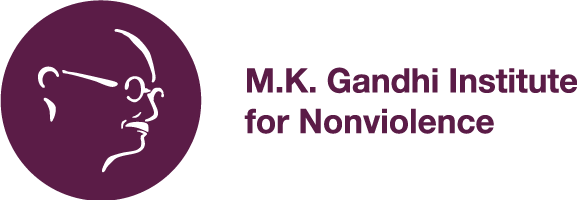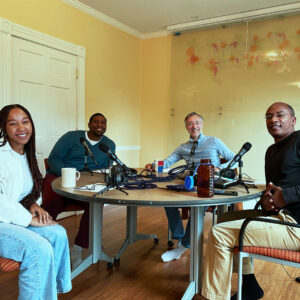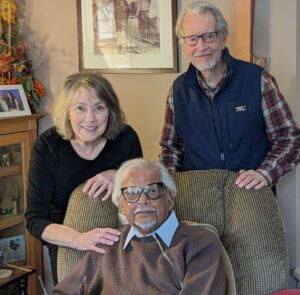We’ve had lots of students reach out to us recently as part of National History Day. Here’s one Q&A exchange between a student and Gandhi director Kit Miller.
1. What do you think India would be like if Gandhi hadn’t existed?
It’s hard to say. If a violent war to kick the British out after 200 plus years of colonial rule had occurred, in such an unstable region of the planet because of its political and economic value to global powers, anything could have happened.
2. How did Gandhi impact the world?
Gandhi’s 20 plus years of work in S Africa definitely had a major effect on that country and the amazing work of Mandela and countless others in ending apartheid in that country as peacefully as they did. Globally the emergence of nonviolence as a form of political expression was supported by Gandhi’s qualities as a human being. Because he lived nonviolence, and didn’t just use it as a means of political change, his life still matters tremendously as a source of inspiration to people of many nationalities and faith backgrounds.
3. What do you think Gandhi’s main leadership qualities were?
Humility, curiosity, perseverance and faith.
4. If you were in Gandhi’s shoes, what choices would you’ve done differently?
Again, hard to say. I’m not a man of a certain religion and nationality who was born in 1869! However a couple of things stand out. I think I would have tried to have more compassion for my own family, wife and sons, who were so affected by the life choices I was making. Gandhi’s relationship especially to his oldest son Harilal was a source of pain for the family for years and I wish it could have somehow been handled differently. The other thing, if I could go back in a time machine, would have been to somehow prevent the ‘divide and conquer’ efforts that the British successfully made between Hindus and Muslims that led to the bloody partition of India into Pakistan.
5. Which speech of Gandhi’s really moved people the most and how?
I’m not sure. He gave thousands of talks over the course of his decades of work, which is amazing given that he was painfully shy as a young person. I think what suited him more was his years of writing and the various journals and newspapers that he started and worked on. More than public talks, that was his major means of communicating his radical ideals to the masses.
6. How did Gandhi inspire you to become an expert on nonviolence?
I don’t think of myself as an expert on nonviolence but as a student who tries to use her life to submit to both the discipline and the structure of nonviolent ideals. Over time this has led to many changes in my life, both internally and in how I spend the resources of my time and money. Gandhi’s life and message have inspired me to take this up as a life-long path.
7. What do you think India would be like currently if India hadn’t split up into two?
I believe it could be more prosperous as millions and millions of dollars have been pumped into the militarys of India and Pakistan to defend borders, which impoverishes both countries, both materially as well as spiritually. If the extraordinary nonviolent leadership of one of Gandhi’s colleagues, Khan Ghaffar Khan, had been available to India after the British left and Gandhi was assassinated, I think it could have had an important effect on the world. Khan was Muslim and from the Northwest Territories so was automatically considered to be part of the new country of Pakistan. However, after partition occurred, he was incarcerated for decades by Pakistan for espousing Gandhian principles. What would global politics look like now if a Muslim man could have become as globally recognized as standing for nonviolence as Dr. King later became? I wonder about that and how it could have affected US choices even today.
8. How did Gandhi affect lives today?
In a survey of CEOS a few years ago, Gandhi was listed as one of the top 5 leaders of all time. He’s recognized as an innovator and someone who, without lots of money, or an army, or a government position, changed the course of human events. I think and hope that human beings will study and more importantly try to emulate his life for years to come. His thinking about sustainability and the importance of local economies was visionary and entirely relevant to today’s issues.
9. What are some key events that made Gandhi “The Father of Our Country” and how?
Gandhi’s life and contribution rightfully have been a source of pride for Indian people for decades. His life and message has inspired many efforts and projects on the grassroots level in India.
10. How was Martin Luther King Jr.a big part of Gandhi’s legacy?
Dr. King demonstrated the universality of nonviolence through grounding it in Christianity and through supporting its flowering in a different time and culture. The work of King and his many, many colleagues, who deserve to be equally well-known in many ways, was creative. They didn’t try to copy what happened in India, they made it their own. Like Gandhi, King espoused a lived practice of nonviolence, not just the use of nonviolence as a political tool. If more people from the civil rights era had truly taken up nonviolence as a living practice, I think it would have had a major positive effect on the US over time that would be felt today. I feel sad that King’s life was cut short and that he did not have the opportunity to develop this approach for decades like Gandhi and Khan did.




